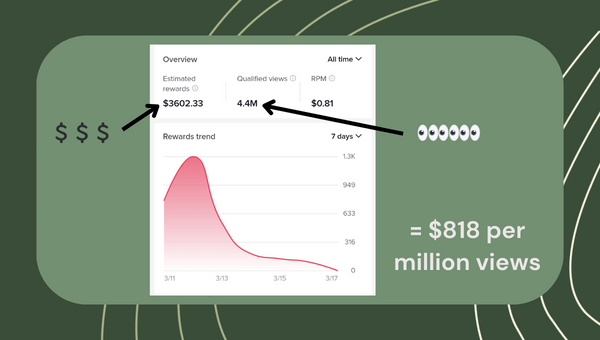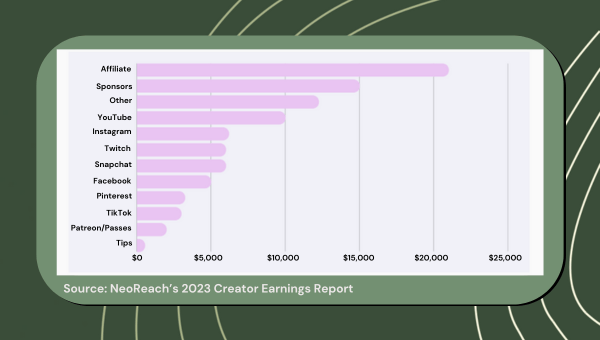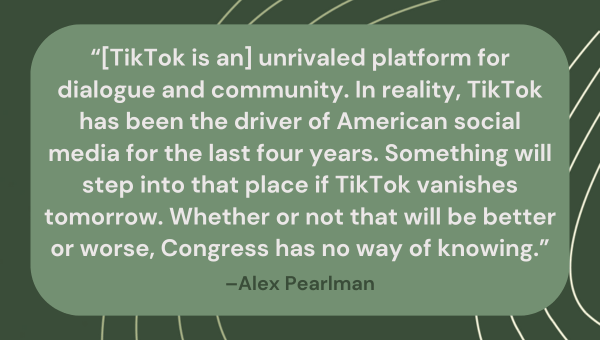My partner’s mom is retiring this year. As boomer households go, we watch the news while we eat dinner over there.
A story about the TikTok ban aired. She said, “Wow. A lot of people are going to lose their income if they go through with this ban.”
Now, this is something I’ve thought of — I work in social media and think about the creator economy all the time.
But I didn’t expect that to also be the first thought of a 65 year old lady.
It got me thinking…
How bad would banning TikTok be, from a financial standpoint?
This week, meet:
➡️ Social media life cycle case study: Vine
➡️ How do TikTokers make money?
➡️ Second-order effects of a TikTok ban
➡️ Budget Bites
Social media life cycle case study: Vine
Ya’ll remember Vine?
Ya’ll remember back when we were calling TikTok “kind of like a new Vine?”
My, how times have changed.
Through Vine, we have precedence for a video-based social platform’s death.
The difference is, Vine’s death was more of an assisted suicide. She was already on the way to her grave when we pulled the plug.
TikTok though? That one’s an assassination attempt.
Recap on what happened to Vine
The economic consequences of Vine shutting down were surprisingly… sparse.
Twitter bought Vine in 2012.
Five years later, Twitter realized it was in no financial position to provide for little Vine. Twitter had its ninth straight quarter of shrinking revenue growth, and had to make some hard decisions.
Vine had millions of users, but had lost over 80% of active users since its peak. Instagram had just launched 15-second videos, and it was all downhill from there.
One crucial detail about Vine:
There were no monetization options.
The only money Vine creators were bringing in was from whatever products they could cut 6.5-second sponsorship deals for:
So when Vine shut down, the complete direct monetary impact was about 50 people getting laid off. The not-directly-monetary impact was creators losing the platforms that made them famous.
Vine: was gently led to pasture by its parent company, Twitter.
TikTok: has the United States government pointing a gun to its head while its parent company ByteDance is ready to go to war.
They are not the same.
How do TikTokers make money?
The first question on the road to figuring out how “bad” losing TikTok would be financially:
How do TikTokers make money, anyway?
The quick and dirty answer:
ZipRecruiter insists TikTok Influencers average a $131,000 salary.
But, it’s obviously more complicated than that.
Ultimately, it’s impossible to nail down an exact number to describe how much people make from TikTok. It’s difficult, even, to get a grasp of just how much TikTok contributes to individuals’ overall income.
The most accurate thing to say is:
A non-negligible number of people make a non-negligible amount of income which would disappear if TikTok disappeared.
But that’s kind of boring.
So read on if you’d like a more convoluted answer…
As of today, here are the 5 most common ways TikTok creators get $$$:
1. Money “from” TikTok
The main way TikTok directly supplies money to creators is through the Creativity Program. If you’re based in the US, are 18 years or older, have at least 10,000 followers, and get at least 100,000 video views in the last 30 days, you qualify.
How MUCH do you make off this program, though?
It depends on a lot of factors — how long your videos are, how good they are, how much engagement they get, where your audience lives, and most importantly, how many views they get. For a taste:
Here’s one creator with 2.5 million followers who shows that she’s made about $677 per million views.
Another with 66k followers averages $1 per 1,000 views (aka, $1,000 per million views).
And lastly here’s some screenshots from someone who seems to get $820 per million views.

2. Money from affiliates
TikTok shop is a built-in way for creators to earn commissions by tagging products in their posts.
One creator earned close to $6,000 in commissions one month for driving $40,000 in product sales.
3. Money directly from audience
TikTokers can also make money through virtual “gifts” during livestreams, which you can convert into real life money.
Sounds innocent enough… Until you learn TikTok’s real intent is to turn it into some sort of modern-day QVC…… Until you see with your own mortal eyes the ungodly direction users have taken it.
4. Money from brand sponsorships
The three previous methods of monetization are baked into TikTok itself. However, creating content at the scale needed to even qualify for those monetization methods demands a near full-time time commitment (or paying to outsource work to an editor, strategist, or other team members).
The problem? Many creators struggle to make the equivalent of a full-time income based solely on what TikTok offers.
Broken down by platform — creators on TikTok are on-average making peanuts. They’re managing to earn less than people on PINTEREST.

Enter: brand sponsorships.
Over 2/3 of creators earn most of their revenue from brand deals. Research from 2023 shows sponsors and affiliates make up the vast, vast majority of income for all creators.
On TikTok, creators can make anywhere from $100 to $100,000+ on a sponsorship — depending on follower size, engagement rate, number of videos required for the agreement, and the success of the campaign.
5. Money from self-promotion
Last but certainly not least — when the Creativity Program runs low, cosplaying as an NPC on Live is off-brand, and the sponsorship checks aren’t flowing in… TikTok creators can always just sell their own stuff.
Musicians promote concert tickets, lifestyle influencers start apparel brands, freelancers sell services.
I’d argue this is the most important aspect of TikTok.
Let me explain…
TikTok and business
Ultimately, if someone is making money from social media — if they create content daily, they create revenue from their efforts, they negotiate sponsorship deals, they sell products… That’s a business.
Most TikTok creators understand they have a business.
Sometimes the business comes first, and they came to the TikTok ecosystem BECAUSE it’s a convenient marketing tool.
Sometimes TikTok popularity comes first, and the creator then whips up a business around that popularity, to “make the most” of a viral accident.
(It’s kind of a fourth-wall-break to think about your favorite creator making videos for you as their literal business. Weird, but true.)
And every business owner must understand a fundamental truth:
Business is risk.
But every smart business owner also understands this:
You have to try to diversify your risk.
For a content creator, this looks like: posting to other platforms, creating and selling multiple products, and, I guess, attempting to migrate a large TikTok audience to your smaller platforms when the government starts voting for banning your main source of income.
(Also - one last thing to note for this section: TikTok apparently has about 7,000 employees in the US. I imagine those folks will lose their jobs if the ban goes through. So if you’re in the market to hire former intelligence officers, keep your ear to the ground…)
Second-order effects of a TikTok ban
So we’ve covered the obvious first-order effects of TikTok shutting down:
TikTok creators will lose a significant piece of income.
Businesses will lose a valuable marketing funnel.
TikTok corporate employees will lose their jobs.
That’s just the first splash.
When you ban a major cultural platform, you can expect many, many ripples.
I’ve thought through just a handful of potential second-order effects of banning TikTok. So. Let’s go through some of those now.
1. The long-term effects on young people.
Sure, ALL social media is arguably bad for brains (especially still-developing brains). It’s not just TikTok that’s bad.
But, if you’ve used TikTok… You kind of get it.
They put some special juice in that TikTok algorithm.
There are concerns about the literacy levels of upcoming generations (a good and succinct analysis of that argument here). On one hand, it could be argued that TikTok is a key culprit in this dilemma. On the other, TikTok has also been the main hub for sharing information about it.
Perhaps shutting down TikTok will re-align young people’s dopamine receptors.
Perhaps something new and just as “bad” will fill the space. Perhaps this problem will require a more complex solution.
2. The effect on consumer spending.
There’s a chance we’ll feel a noticeable gap left in the economy in general.
By the end of 2023, $7 million of transactions were happening PER DAY on TikTok shop.
If TikTok has their way, Shop will transact $17 billion for 2024.
And that’s JUST transactions happening in-app for TikTok. There’s no real way to track the extra purchases happening directly to a business through bio link clicks or looking up a business off-app.
Certainly, at least a portion of that $17 billion in consumer spending will still get, ya know, spent even without TikTok. But likely not close to all of it.
Business-first TikTok accounts may struggle to reach the same amount of customers on existing platforms, and sales may plummet.
All this means potentially less money circulating around the US economy.
3. The potential to sell to an American company.
It’s unlikely TikTok’s parent company will opt for it, but the bill does give TikTok the option to sell to an American company rather than shut down in the US altogether.
The most likely candidates for a sale are Meta (who owns Facebook & Instagram) or Google (who owns YouTube and, well, Google).
As if social media companies aren’t already way too consolidated, a TikTok acquisition could mean an internet with a complete lack of algorithmic diversity.
4. The cultural loss.
For better or worse, this is where my mind goes first at the thought of losing TikTok.
In a Tiktok ban, certain online communities will be lost forever.
As one creator put it:

5. If they don’t sell
Let’s say we go through with this TikTok ban.
ByteDance says, “🖕 we’re not selling. Bye.”
Now there’s NO TikTok.
Realistically… SOMETHING will eventually fill its place.
Whether Instagram beefs up monetization methods for creators, YouTube steps in to fill the gap, or some new Silicon Valley monstrosity arises…
Could a TikTok by any other name smell as sweet?
Budget Bites
💳 If you ban TikTok… Then how will we get this inspirational content???
😊 Friendly reminder: Consumer spending is NOT your responsibility.
👵 Finally: a reasonable take on changing the retirement age.
📈 Budget breakdown: 28-year salary breakdown for a couple with 4 kids.
🛍️ THINK BIGGER: No more squandering this valuable resource, ladies…
“Wait, I need MORE”
A couple things happening in the Meet Your Money world:
More budget breakdowns and real talk on finances here on the newsletter & on socials. Completely free, always.
Budget Club. Twice monthly. Currently at my house. With my friends. You’re not invited. (I hope to make this a recurring, free, online event soon… Stay tuned!)
And coming soon — templates and 1:1 consulting time for those who need a little extra nudge.
